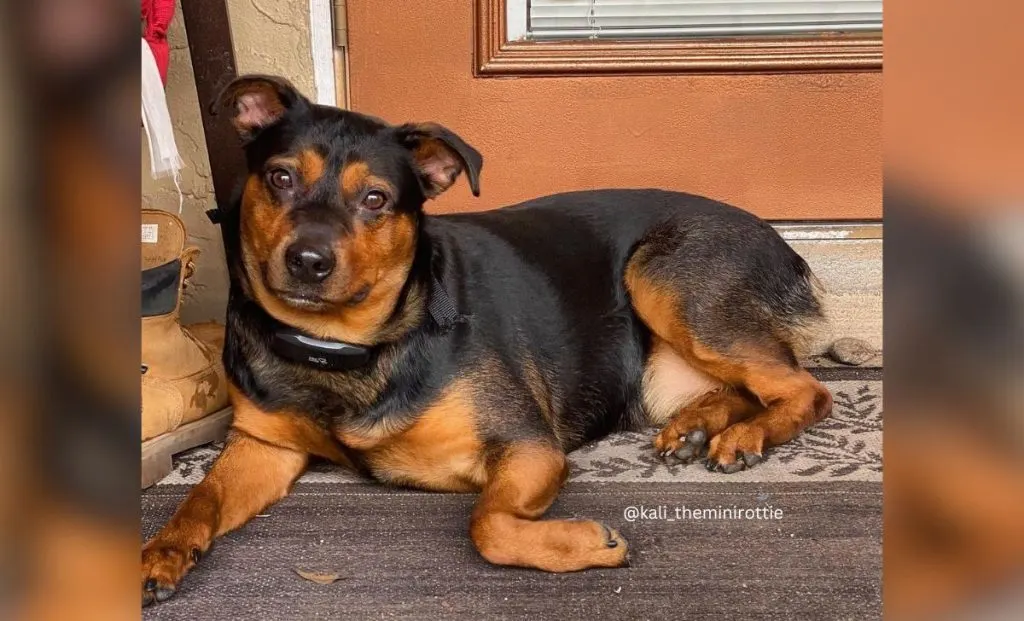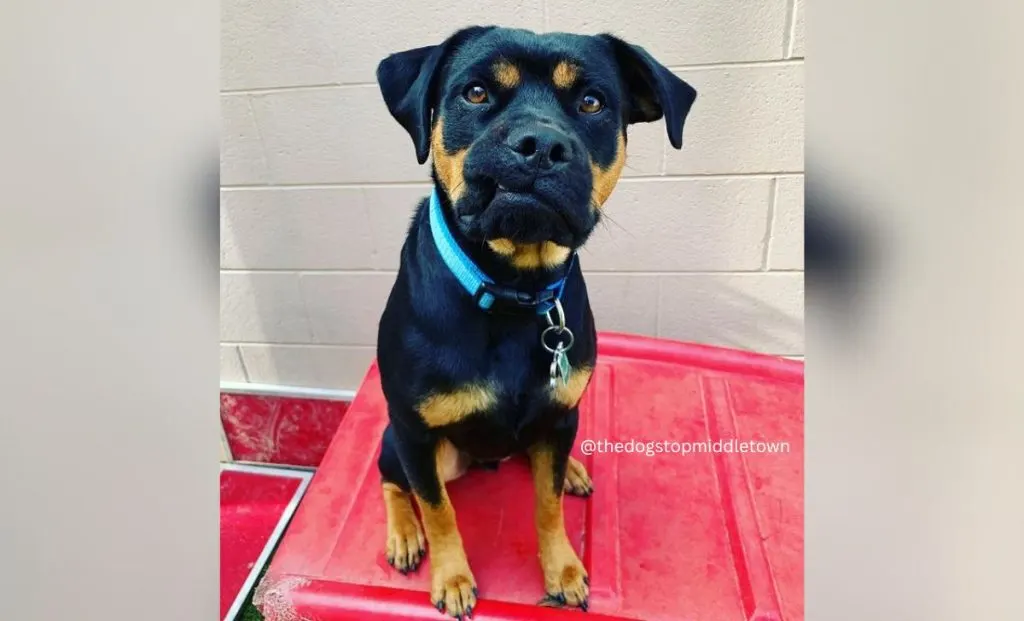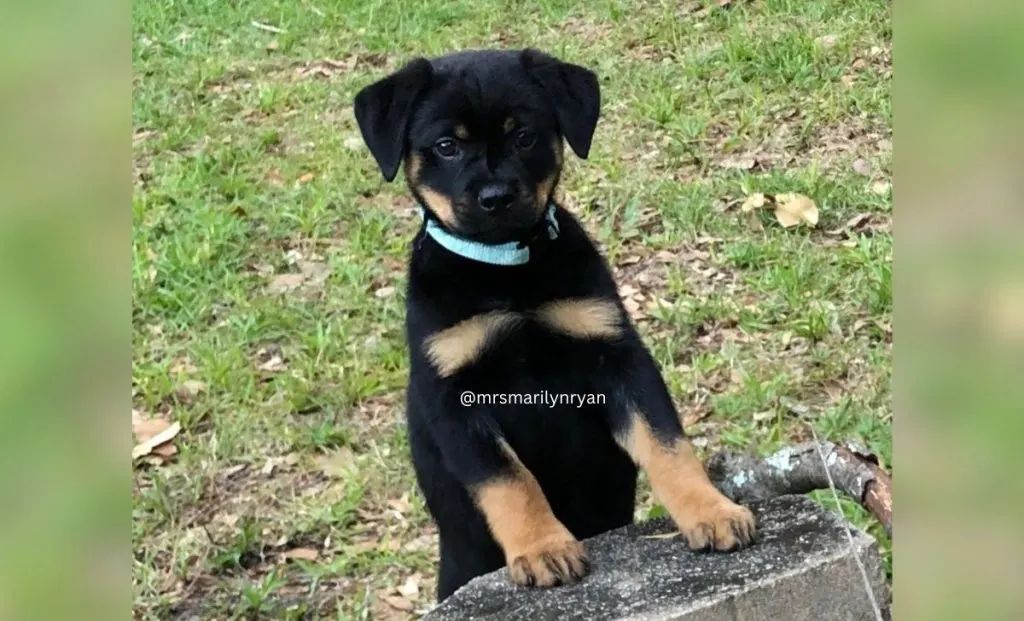Are you looking to buy a proper guard dog but don’t have lots of space for a guardian, such as a Rottweiler or a Doberman Pinscher? Then you might be interested in Miniature Rottweilers!
These doggies are smaller than standard Rottweilers, making them more suitable for apartment living, which is why they’re a dream come true for many dog owners.
But what is the truth about this breed? Are these doggies real, or are they just another scam with the intention to take our money?
While dogs called Miniature Rottweilers undoubtedly exist, many other things about this breed are shrouded in mystery.
Fortunately for you, I have taken some time researching this adorable small dog breed, and I have some knowledge to share!
Here’s everything you need to know:
Is There A Miniature Rottweiler?

Yes, Mini Rottweilers are most certainly a thing! However, it’s still uncertain whether they can be considered true Rotties or not.
Many Miniature Rottweilers are simply Rotties that didn’t grow as large as the rest of their breeds. This can happen with runts of the litter, which are crossbred for generations to keep their small stature.
However, these doggies are usually not much smaller than their full-sized counterparts. While the difference can be seen, it’s hard to believe that many people would consider them small dogs, as they’re medium-sized at best.
Another option is that these are simply Rottweilers with dwarfism or some similar condition that has kept them at a small size.
Finally, some Miniature Rottweilers are the product of crossbreeding. Breeders would combine Rottweiler with some other breed to create a Rottweiler mix that will come in a smaller size.
It goes without saying that any of these scenarios are pretty bad, and the intentional breeding of pups with health conditions is a terrible practice. The same can be said for irresponsible breeders who crossbreed a dog and then try to sell it as a purebred pup with some weird quirk.
Are Pocket Rotties Real?
Pocket Rottie is, in fact, just another name for a Miniature Rottweiler. Other names you might’ve heard of include Mini Rotts and Rottiebears.
Some people like to think Pocket Rotties are simply the smallest Miniature Rottweilers available. This can be the case.
However, if you have a small, pocket-sized dog that looks just like a Rottweiler, that pup is most certainly a crossbreed or a dog with a severe case of dwarfism.
It’s impossible for purebred Rottweilers to be that small. This is why many breeders will try mixing them with smaller dog breeds and create a dog with all the features of a Rottweiler but in a toy size.
For example, you have a Rottchi, one of the Chihuahua mixes that looks just like a tiny Rottweiler. This pup can easily pass as a pocket or toy Rottie.
But no purebred Rottie can be pocket-sized, or at least not a healthy one.
Appearance

A Miniature Rotty, as its name suggests, looks just like a Rottweiler – but smaller.
These pups have a muscular build, flat faces, and short, floppy ears. They come in standard Rottweiler colors, which include a black base coat and mahogany or tan markings.
They’ll also have dark brown eyes, as lighter colors are prohibited in the breed.
Ear cropping and tail docking are not standard procedures, neither in purebred Rotties nor in Miniature ones. This is one of the few characteristics that sets Rotties apart from Doberman Pinschers.
If a Miniature Rottweiler is a crossbreed, he might inherit some traits from a different parent, but most breeders will try to avoid this. The point is to have a dog that looks like a standard Rottweiler in the end.
As for their size, this can vary greatly.
Standard Rottweilers typically stand between 22 to 27 inches at the shoulder and weigh between 80 to 135 pounds. Miniature Rottweilers can be anything smaller than that.
Some Rottweilers that are around 20 inches in height are considered miniature. They are quite smaller than some of the largest pups of this breed, after all.
On the other hand, you have dogs such as the already mentioned Rottchi, which is typically no taller than 9 inches! Now, this is truly a pocket-sized dog.
As for their weight, this also depends on the dog’s individual size. Most Miniature Rottweilers will weigh between 30 and 60 lbs, which is way less than regular Rotties, which have a weight of about 100 lbs on average (sometimes even more).
Of course, keep in mind that, as this isn’t a recognized breed, there is no breed standard. This means that their looks can vary greatly from what you can see in pictures.
Temperament

When it comes to the temperament and intelligence of the Miniature Rottweiler, this can be challenging to predict. There are so many reasons why a Rottie might be of smaller size, and most of them can affect character traits.
Some would consider Miniature Rottweilers to be the smallest guard dogs out there. While I didn’t have many experiences with small breeds as guard dogs, I can say with confidence that this is a protective breed that will stay loyal to you to the end.
Rottweilers are one of the oldest breeds of dogs. The reason why they are so popular is precisely because of their great temperaments. These are confident and courageous pups that will do anything to keep their owners safe.
They are friendly dogs that can be wary of strangers, especially if not socialized on time. At the same time, they aren’t naturally aggressive, despite some circulating rumors.
As Miniature Rottweiler is – well, mini, he is also likely to have more energy. You can expect your Rottie to run around all day and night! These pups are usually very friendly, outgoing, and affectionate, to the point of being clingy.
Also, they tend to be lap dogs, so it’s a good thing they aren’t large dogs.
They are more affectionate than their larger counterparts – at least most of the time. Certain crossbreeds tend to have the temperament of their smaller breed parent, and these tiny pups are known for having a temper. Just think about Corgis or Chihuahuas!
Are Mini Rottweilers Good Family Dogs?
All Rottweilers are known for their devotion to their families. They are more affectionate than many people realize, and the same goes for their miniature cousins.
However, you need to socialize and train them on time to make sure they will listen to your commands and that you can control them.
Despite their smaller size, they can still cause serious harm if you haven’t trained them properly. Never leave anything to chance.
Other than that, many mini Rotties are known to be very calm and patient, making them good companions for young kids. They make excellent nanny dogs and will enjoy long play sessions with your children and other family members.
Once again, the temperament might vary greatly if the pup is purebred, so you need to be open-minded. Each dog has its own individual temperament, and you need to respect this.
Are Mini Rottweilers Good Guard Dogs?
Don’t let their tiny stature fool you. These dogs do an amazing job in keeping both you and your home safe.
These are protective dogs that will guard their homes with care. No burglar or intruder will dare walk past them, especially when they hear the bark, which will make them think they’re dealing with a large size pup.
Most good breeders have specific breeding programs with the goal of combining dogs and breeds that are known to be good at guard duties. This will result in a dog with a tested temperament.
Some pups might even have certificates that they are approved to work as guard dogs.
Are Mini Rottweilers Good With Other Pets?
Mini Rottweilers can be good with other pets if you’ve socialized and trained them on time.
They have a high prey drive, so they might have some issues around small pets. Make sure your dog knows that your hamster or a lovebird isn’t prey. Otherwise, you might end up with one less pet pretty soon.
Unspayed females and males who aren’t neutered can be aggressive dogs toward pups of the same gender. This is why it’s important to fix your pups as soon as possible.
Fixed Rotties are usually okay with other dogs of similar size as long as they’re used to having other pets around them.
Taking Care Of A Miniature Rottweiler

Just like with any other breed, taking care of a Miniature Rottweiler isn’t an easy task. These are living beings with their own needs that you, as an owner, need to satisfy.
While this isn’t a large breed, this doesn’t mean that they need any less care. Fortunately, with some knowledge and a little patience, you can properly care for your new pooch.
Here’s what you need to keep in mind:
Exercise Requirements
These pups have great energy levels that need to be depleted in many different ways.
They’ll need long exercise sessions, at least an hour of daily walk, and long play times.
If you lead an active lifestyle, this is the perfect dog for you. Mini Rotties will love following you around, no matter what you’re doing at that time. You can walk with them for a long time, and they aren’t likely to get tired.
Don’t underestimate the importance of a good play session. A long portion of a tug-of-war or fetch can do wonders for their physique and mental being.
Speaking of mental beings, these doggies need lots of mental stimulation. They are intelligent dogs that can get bored easily, and it’s your job to ensure this doesn’t happen.
Training
Most Miniature Rottweilers are quite easy to train. This is because all Rottweilers share a strong bond with their owners and the desire to please them.
They are also rather smart, so they can understand what you’re expecting of them after just a few attempts.
In fact, they have an interesting mix of independent streak and that desire to make their owners happy, which will make training sessions all the more interesting.
This is a good thing, as they do require lots of training sessions. These pups can be dangerous, so you don’t want to risk it.
Keep in mind, once again, that if a dog is crossbred, his personality might differ from this. This can make training more or less challenging. Still, if you have experience with purebred Rottweilers, this will give you a head start.
Grooming
Grooming Rottweilers of any size isn’t a challenging task. This is a short-haired breed that doesn’t require lots of brushing.
However, due to their undercoat, they will shed a lot, especially between seasons. Daily brushing can help you keep loose hairs at bay.
Don’t forget about bathing! As these active dogs love to roll in the mud (and poop, occasionally), you will need to clean their paws before you go into the home.
Full bathing is necessary from time to time, but don’t go overboard, as you’re risking disrupting the natural oils on the pup’s skin. A bath every two months is enough as a part of a regular grooming routine.
Of course, all dogs require nail trimming and ear cleaning, as well as teeth brushing.
Miniature Rottweiler Common Health Problems
Unfortunately, health is always a big issue with miniature and toy breeds. This is especially prominent in mini Rotties, which are known to be runts of the litter or mutts.
Runts are known for being smaller than other puppies. Also, they are more prone to health issues, so they are more likely to be prone to illnesses or struggle with some hereditary genetic conditions.
As for the crossbreeds, it’s true that they tend to be healthier than purebred dogs. The issue, however, is that you might be getting a mutt without realizing it. This also implies that the breeder never disclosed possible health issues the parents of these pups might’ve had.
However, they still tend to be healthier than many other miniature breeds, such as Pocket Bullies or Teacup Chis.
Some of the health issues you might see in your Miniature Rottweilers include:
- Intervertebral Disk Disease (IVDD), a common health problem in toy dog breeds that causes problems with the spine.
- Brachycephalic Airway Syndrome, which tends to affect flat-faced dogs. They are especially common if your pup is crossbreed with some smaller Bulldog breed.
- Hypoglycemia, a drop of sugar levels in a dog’s blood, also rather prominent in small breeds.
- Aortic Stenosis, a genetic condition that all Rottweilers are prone to.
- Progressive Retinal Atrophy (PRA), a hereditary eye disease that is also common in Rottweilers, especially older dogs.
- Bone Cancer – Sadly, Rotties have a higher-than-average cancer risk for many types of tumors, especially bone cancer.
One of the ways to ensure your Miniature Rottweiler has the best quality of life possible is to never skip regular vet visits and to provide your pooch with a balanced diet.
Proper amounts of exercise are also helpful if you want to ensure your doggies develop properly.
Just because a dog is small doesn’t mean he doesn’t need regular exercise. While you don’t want to go overboard, everyday walks and play sessions are mandatory.
Finally, it’s always a good idea to pay for pet insurance to make sure you can cover all the necessary expenses. Let’s just hope you never need to use it!
This is also why it’s important to only buy from good breeders who will conduct health tests on their puppies and parent dogs. This will minimize any chances of genetic disorders.
How Long Do Miniature Rottweilers Live?
When it comes to the lifespan, it always depends on many individual factors. However, some expectations can be made.
Purebred Rottweilers have an average lifespan of 8 to 10 years. Due to certain genetic conditions that might have caused their small size, most Miniature Rotties won’t live longer than that.
Both runts of the litter and pups with dwarfism are known to live shorter lives as their health is compromised. Of course, this isn’t always the case, and many such dogs are known to live long and healthy lives.
On the other hand, if you own a crossbreed, you need to consider the lifespan and general health of the other parent.
If your Rottweiler is mixed with some long-lived breed, such as French Bulldog, which is known to live around 12 years, you can expect your mixed breed pup to live longer than its purebred Rottweiler parent.
Mixed breed dogs are also known to be healthier due to an expanded gene pool, and this might additionally increase their lifespan.
Either way, you can expect your pooch to stay by your side for at least a decade.
Should You Buy A Miniature Rottweiler?
After reading all this, you probably already have an idea about whether a Miniature Rottweiler is a good dog breed for you.
These pups are good guard dogs that don’t require lots of space but still need plenty of activity to stay happy.
Also, while they aren’t as large as purebred Rotties, they still require early socialization and lots of training, so they might not be a good choice for new owners.
Still, if you have experience with challenging dog breeds, or if you want a guard dog that is easier to care for compared to large dog breeds, Miniature Rottweiler might be an excellent choice for you.

Vanja’s passion for writing started at an early age, which is why she pursued Journalism as her college degree. She can research any topic and find all the information before you bat an eye, which is a great thing for her job but a terrible one for her husband.
Even as a young child, she fell in love with everything fluffy – but dogs have a special place in her heart due to her childhood companion, a Corgie named Archie.
Motivated by her experiences and driven by a desire to give back to her four-legged companions, she spends her free time volunteering at a local dog shelter.
